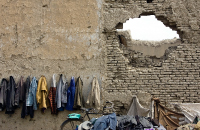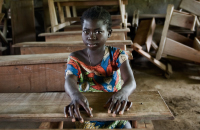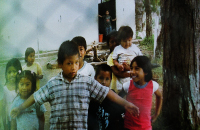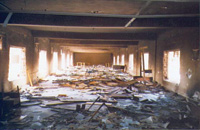Hundreds of schools had been closed for almost a week after a female principal was murdered.
News Archive
December 03, 2012
November 23, 2012
The issue of militaries using schools as barracks, bases, detention centers, firing positions and training grounds during conflicts is rarely discussed - writes campaigner
November 23, 2012
A global coalition of United Nations agencies and international NGOs supporting education and human rights has called for governments to implement a “clear and unamibiguous” ban on the use of schools and universities as barracks and bases during conflicts.
November 22, 2012
I approached the school—high in the hills of northern Luzon—with a bit of trepidation. It was late in the day, and schools that lack the joyous cacophony of children playing always seem a little eerie to me.
November 22, 2012
Al igual que muchos otros jóvenes somalíes que entrevisté en Kenia, Xarid M. recorrió cada día las peligrosas calles de Mogadishu, la capital de Somalia, para asistir a la escuela mientras fue posible. Pero todo cambió por completo el día en que el grupo insurgente islamista Al-Shabaab llevó la guerra hasta su propia aula.
November 21, 2012
MANILA, Philippines – The Philippines is among conflict-ridden countries where the military continues to use schools as camps, New York-based Global Coalition to Protect Education from Attack said.
November 21, 2012
When soldiers arrived in Bangued village in the mountains of northern Philippines in May 2011 they set up a barracks in the storage bunker below the principal’s office in the elementary school. Teachers reported that while the soldiers kept weapons in their quarters, they never carried arms on school grounds and rarely wore uniforms.
November 21, 2012
Comme beaucoup de jeunes Somaliens que j'ai interviewés au Kenya, "Xarid M." a affronté les dangers des rues de Mogadiscio, la capitale somalienne, tant qu'il pouvait aller à l'école. Mais tout a changé le jour où le groupe insurgé islamiste Al-Chabab a fait entrer la guerre dans sa salle de classe.
November 20, 2012
In countries embroiled in war, government soldiers and rebel fighters frequently establish bases in school buildings not just for days but sometimes for years. They exploit school infrastructure to house and protect troops, hold detainees, store ammunition, and fire at their enemies.
November 20, 2012
Like many of the Somali youth I interviewed in Kenya, “Xarid M.” had braved the streets of Somalia’s capital, Mogadishu, for as long as he could to go to school. But that all changed the day the Islamist insurgent group al-Shabaab brought the war to his classroom.




